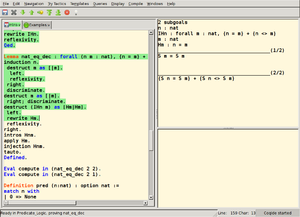- Coq
-
Coq 
Paradigm(s) Functional Stable release 8.3 (October 2010) Typing discipline static, strong Influenced by ML and Standard ML Influenced Agda OS Cross-platform License LGPL 2.1 Usual filename extensions .v Website Coq website In computer science, Coq is an interactive theorem prover. It allows the expression of mathematical assertions, mechanically checks proofs of these assertions, helps to find formal proofs, and extracts a certified program from the constructive proof of its formal specification. Coq works within the theory of the calculus of inductive constructions, a derivative of the calculus of constructions. Coq is not an automated theorem prover but includes automatic theorem proving tactics and various decision procedures.
Coq implements a dependently typed functional programming language.[1]
It is developed in France, in the TypiCal (ex-LogiCal) project, jointly operated by INRIA, École Polytechnique, Paris-Sud 11 University and CNRS. There was also formerly a group at École Normale Supérieure de Lyon. The team leader is Senior Scientist Benjamin Werner. Coq is implemented in Objective Caml.
The word coq means "cock" (rooster) in French, and stems from a tradition of naming French research development tools with animal names. It is also a reference to Thierry Coquand, who developed the aforementioned calculus of constructions along with Gérard Huet. Also, at first it was simply called Coc, the acronym of calculus of construction.
Contents
Four color theorem and ssreflect extension
Georges Gonthier (of Microsoft Research, in Cambridge, England) and Benjamin Werner (of INRIA) used Coq to create a surveyable proof of the four color theorem, which was completed in September 2004.[2]
Based on this work, a significant extension to Coq was developed called Ssreflect (which stands for "small scale reflection"). Despite the name, most of the new features added to Coq by Ssreflect are general purpose features, useful not merely for the computational reflection style of proof. These include:
- Additional convenient notations for irrefutable and refutable pattern matching, on inductive types with one or two constructors
- Implicit arguments for functions applied to zero arguments - which is useful when programming with higher-order functions
- Concise anonymous arguments
- An improved
settactic with more powerful matching - Support for reflection
Ssreflect 1.2 is freely available under the open source CeCill-B or Cecill-2.0 license (your choice), and is compatible with Coq 8.2pl1.[3]
See also
- Curry-Howard
- Intuitionistic type theory
- Compcert an optimizing compiler for C (programming language) which is fully programmed and proved in Coq.
References
External links
- The Coq proof assistant - the official English website
- Cocorico!, the Coq Wiki
- MSR Inria math components - hosts the Ssreflect extension
- Constructive Coq Repository at Nijmegen
- Math Classes
- Textbooks
- The Coq'Art - A book on Coq by Yves Bertot and Pierre Castéran
- Certified Programming with Dependent Types - online draft textbook by Adam Chlipala
- Software Foundations - Online textbook by Benjamin C. Pierce et al.
- Tutorials
- Introduction to the Coq Proof Assistant Video lecture by Andrew Appel at Institute for Advanced Study
- Video tutorials for the Coq proof assistant by Andrej Bauer.
Categories:- Proof assistants
- Free theorem provers
- Dependently typed languages
- OCaml software
- Free software programmed in OCaml
- Functional languages
- Programming languages created in the 20th century
Wikimedia Foundation. 2010.

